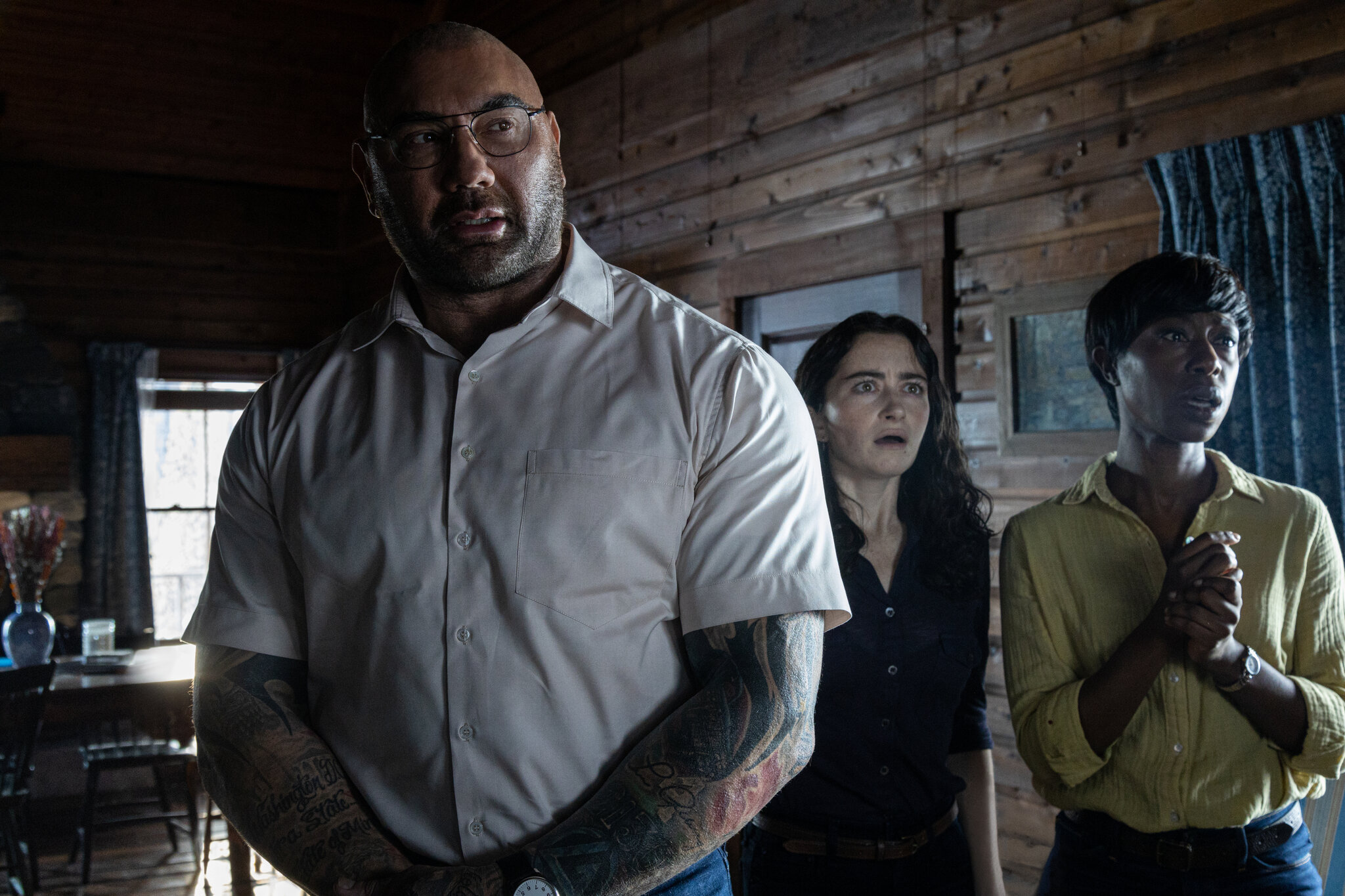Film Review: Knock at the Cabin (2023)

What I like about M. Night Shyamalan is that, even when his movies are less-than-acclaimed, the ideas behind his stories are generally sound. His tragic flaw (if one could say such a thing exists) is not with premise but with development – with what happens after his film’s grounding concepts have taken root in our minds and where they go, or don’t go, from there. It’s these gray areas between conceptualization and realization that make up the meat of a film’s plot, pacing, characterization, and everything else that matters to critics and audiences alike – and exactly where Shyamalan unfortunately slips.
I’m no shill for Shyamalan’s work (I’ve only actually seen five of his fifteen films – six if you count getting thirty minutes into The Last Airbender and abandoning it with disgust), but I loved Unbreakable (one of the most unique superhero movies ever made) and liked Signs and The Village where many others didn’t. With his newest film, Knock at the Cabin (based on the novel The Cabin at the End of the World by Paul Tremblay), Shyamalan has taken all his past issues with concept development and execution, lit them on fire, and burned down the entire house with them.
This is a film that takes a solitary conceit, opens it up into an impossibly brutal moral quandary, and then lets it flourish through fantastically acted dialogue and pacing. At its core, the premise behind Knock at the Cabinremains the kind of singular idea Shyamalan films are known for (for good or bad), but this time he’s managed to expound on that idea to great effect.
Here’s the abstract: while vacationing in rural Pennsylvania, Eric and Andrew (Jonathan Groff and Ben Aldridge), along with their 7-year-old adopted daughter Wen (Kristen Cui), are accosted by a menacing group of intruders (Dave Bautista, Rupert Grint, Nikki-Amuka-Bird, and Abby Quinn) who insist they be let inside the remote cabin. After Eric and Andrew refuse, the foursome break their way in, tie up the vacationers, and present them with a request that no sane person could possibly oblige. The trespassers claim that, in order to prevent a biblical apocalypse from beginning the next day, one member of the vacationing family must kill another.
Of course, Eric and Andrew think their captors are completely insane, something that solidifies further after each one takes extreme measures to convince the couple of their sincerity. Over time, and after the doomsayer’s cataclysmic predictions begin to come true, it becomes unclear whether insanity or prophecy are behind the bizarre events.
For some, it may be obvious who these interlopers are (or at least represent – there are four of them, and they happen to be waxing philosophical about the apocalypse), but even if this is so, it doesn’t take away anything from the story. Shyamalan approaches these mythical figures from such a unique perspective that it’s easy to forget any lore you think you know in favor of the new mythos unfolding before you. Gone are the powerful riders wielding Earth-shattering abilities and allegorical meaning, and in are ordinary working-class men and women plagued by visions and thrust into roles they never asked for.
Also gone, outside of what each viewer may bring to the table either knowingly or otherwise, are nearly all the usual religious aspects associated with the famed cavaliers. Instead, Shyamalan hints that the disasters unfolding around the world aren’t religious in nature at all but are the result of mankind’s hubris and irresponsibility towards the planet and each other. Perhaps more than any of his other films, Knock at the Cabin sees Shyamalan layer meaning and nuance on top of each other to form a thought-provoking story that’s much deeper and more meaningful than it appears.
While its story and structure hold up to scrutiny all on their own, Knock at the Cabin also happens to boast one of the most surprising performances of the year by none other than former pro-wrestler Dave Bautista. When I saw this thick-necked brute begin his wrestling career back in the early 2000s, you could not have convinced me in a million years that he’d be capable of executing a dramatic role so elegantly.
As Leonard, the de facto leader of the apocalyptic intruders, Bautista manages to be both terrifyingly intimidating and soulfully sympathetic without ever raising his voice. Leonard is not a Heath Ledger “Joker,” an Anthony Hopkins “Hannibal Lecter,” or any other variation of a sympathetic psychopath. In fact, he’s not psychopathic at all. Confused? Maybe. Driven? Definitely, but he’s not crazy by any identifiable marker other than that what he says can’t possibly be believed by any rational mind. That is, until rational minds start to believe him.
Bautista’s soft-spoken delivery is simply magnificent, and that it’s also some of the most poignant movie disaster divination I can recall makes it all the more irresistible. And I realize how strange this must sound, but whatever your thoughts are about Shyamalan and his on-again, off-again filmography, or wrestlers-turned-actors for that matter, I urge you to see Knock at the Cabin, if for no other reason than to see a multiple-time WWE heavyweight champion turn in the kind of performance many actors could only dream of pulling off.

